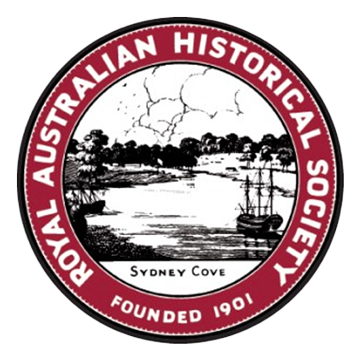RAHS Upcoming Events
The Royal Australian Historical Society has an established tradition of delivering a diverse Calendar of Events throughout the year, helping make history accessible to all. This program includes lectures, skills-based workshops, regional seminars, tours and book launches.
The annual RAHS Conference is a highlight of the Society’s activities. It provides an opportunity for the RAHS and its Affiliated Societies to network at a conference dedicated to promoting local and community history, showcasing the research of individuals and societies.
February 2026
RAHS Day Lecture – What You Didn’t Know About the Letters of Rachel Henning
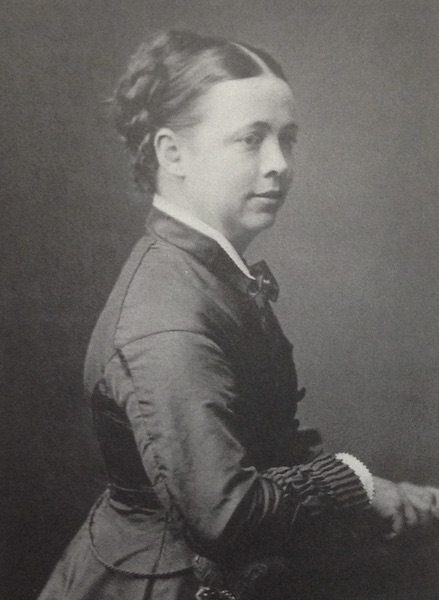
Rachel Henning (Supplied: Angela Phippen)
Event Date & Time: Wednesday, 4 February 2026 @ 1.00 pm – 2.00 pm
Event Location: History House, 133 Macquarie St, Sydney NSW 2000 (hybrid)
Cost: Free
Event Description:
In 1951–1952, The Bulletin published a series of letters written by Rachel Henning covering her experiences coming to and living in Australia, between 1853–1882. They became a publishing phenomenon with multiple subsequent standalone editions. However, only half of her original letters were ever published and those that were had been edited. In this illustrated lecture, Angela Phippen will explain what was edited and why. The lecture is based on Angela’s research as a State Library of NSW Visiting Fellow in 2025.
About the speaker:
Angela Phippen has been a professional librarian for over 40 years having worked at the Society of Australian Genealogists and as Local Studies Librarian with City of Ryde Libraries. She has diverse research interests including NSW divorce records; war memorials and honour boards; and the nineteenth-century stained-glass artist, pastoralist and surveyor, George Hedgeland – Rachel Henning’s brother-in-law.
March 2026
RAHS Day Lecture – The Last Tour: The Robeson’s Visit to Australia and New Zealand
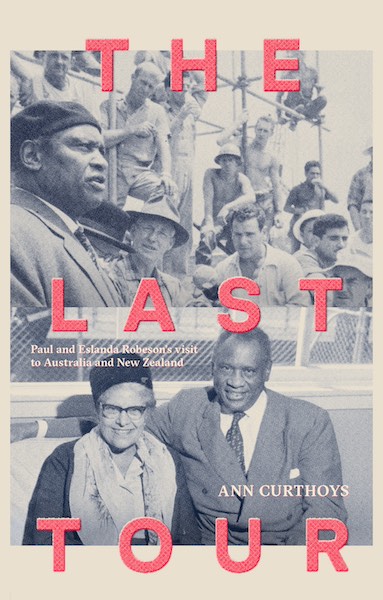 Event Date & Time: Wednesday, 4 March 2026 @ 1.00 pm – 2.00 pm
Event Date & Time: Wednesday, 4 March 2026 @ 1.00 pm – 2.00 pm
Event Location: History House, 133 Macquarie St, Sydney NSW 2000 (hybrid)
Cost: Free
Event Description:
Paul Robeson was once the most famous African American in the world. Not only was he a renowned singer and actor, he was also a former professional athlete, lawyer and civil rights activist. Paul and his wife, Eslanda – a notable civil rights activist, author, United Nations journalist and anthropologist – were finally able to tour Australia and New Zealand in 1960, after the US government denied Paul a passport until 1958. The Robeson’s tour encompassed concerts, talks to unionists, fans, women’s organisations, communists, and peace activists. It involved active engagement with Indigenous peoples and their struggles in both countries. Through the Robeson’s eyes we see life on the Far Left, the emergence of new forms of Aboriginal and Māori protest, and the reception and influence of African American entertainers in Australia and New Zealand. Based on extensive new documentary and oral history research, The Last Tour explores why the Robeson’s trip was such a success and how it exerted a profound influence both at the time and over future generations.
About the speaker:
Ann Curthoys AM, FASSA, FAHA has written extensively about race, class and gender in Australian history, with an interest in both its British imperial contexts and its American, especially African American, connections. Influenced by her mother’s involvement in pro-Aboriginal political activism and her own participation in the 1965 Australian Freedom Ride, Curthoys established the Women’s Studies Program at the Australian National University, taught History at the University of Technology Sydney, and later returned to ANU where she became the Manning Clark Chair of History. She is now Professor Emerita at ANU, an honorary professor at the University of Sydney, and is a Member of the Order of Australia (AM).
RAHS Special Lecture – Rock and Tempest: Surviving Cyclone Tracy and its Aftermath
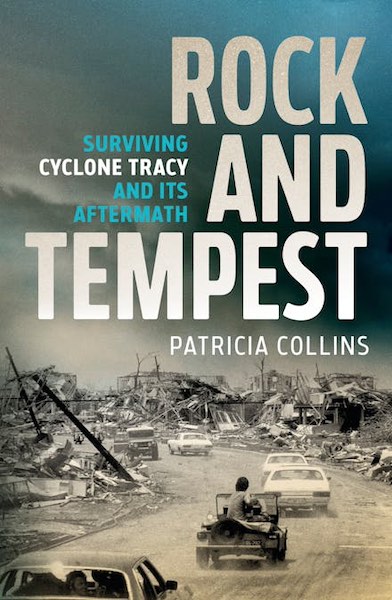 Event Date & Time: Friday, 6 March 2026 @ 1.00 pm – 2.00 pm
Event Date & Time: Friday, 6 March 2026 @ 1.00 pm – 2.00 pm
Event Location: History House, 133 Macquarie St, Sydney NSW 2000 (hybrid)
Cost: Free
Event Description:
When Cyclone Tracy flattened Darwin on Christmas Day 1974, it was the worst natural disaster Australians had ever experienced. Stationed in the city with the Women’s Royal Australian Naval Service, Patricia Collins not only lived through Tracy but was part of the massive clean-up effort. The experience of living through a terrifying natural disaster is chillingly told as she recounts her own dark hours that Christmas, along with those of her contemporaries. In the days after Tracy, the majority of Darwin’s population was evacuated interstate as the Navy’s Task Force arrived to clean up and rebuild. In this talk, Patrica Collins will share first-person accounts of the terror and uncertainty as well as courage and survival. It is a fascinating and moving story.
About the speaker:
Patricia Collins was a member of the WRANS, the Women’s Royal Australian Naval Service, based at HMAS Coonawarra in Darwin when Cyclone Tracy destroyed the city on Christmas Eve 1974. Patricia wasn’t evacuated but stayed and worked on clean-up duties for months. Patricia wrote the book Rock and Tempest in her 60s, to record the achievements of her fellow Navy women and men at that time. Rock and Tempest, published by Hachette Australia in 2024, won the Anzac Memorial Trustees Military History Prize in the State Library of NSW History Awards in 2025.
RAHS Special Lecture – A Darkened Heart: The Life and Times of Frank Arkell
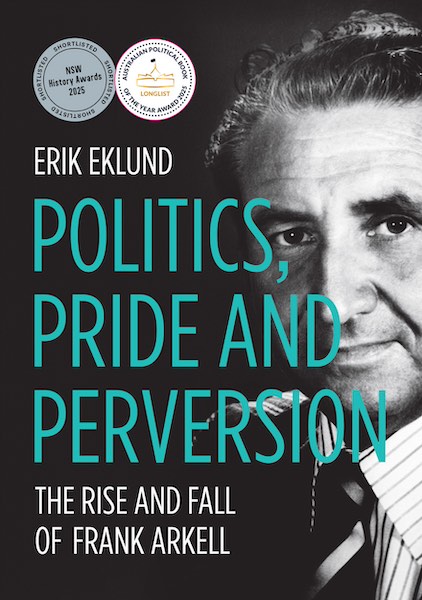 Event Date & Time: Wednesday, 18 March 2026 @ 1.00 pm – 2.00 pm
Event Date & Time: Wednesday, 18 March 2026 @ 1.00 pm – 2.00 pm
Event Location: History House, 133 Macquarie St, Sydney NSW 2000 (hybrid)
Cost: Free
Event Description:
In the 1970s and 1980s, Frank Arkell dominated Wollongong politics. His irrepressible energy and relentless advocacy for the city won him widespread popularity. But there was growing disquiet over his private life which many said involved anonymous assignations with young men and even boys. In 1997 these rumours culminated in police charges of sexual abuse. Before legal proceedings could be concluded, he was brutally murdered by a young man on 26 June 1998. Erik Eklund’s work on Arkell tries to make sense of these extremes of civic engagement and private perversion all cut short by a dramatic fall from grace and then a shocking murder.
About the speaker:
Erik Eklund is an award-winning historian and Adjunct Professor of History at the Australian National University. He was Professor of History and Head of School at Monash University from 2008 to 2013 and the Keith Cameron Visiting Professor in Australian History at University College Dublin, Ireland, from 2015 to 2016. He is currently working as the Deputy Director of Research at the Sea Power Centre in Canberra.
April 2026
RAHS Day Lecture – Saffron Incorporated: The first King of the Cross
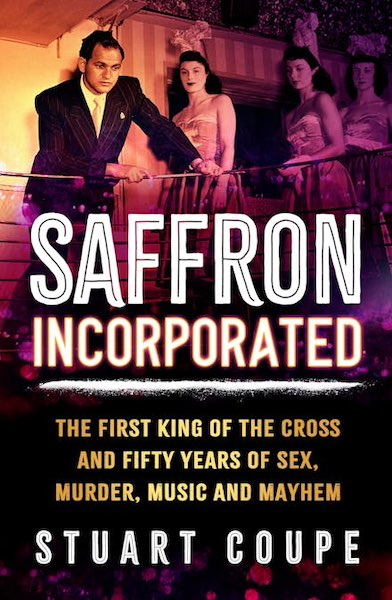 Event Date & Time: Wednesday, 1 April 2026 @ 1.00 pm – 2.00 pm
Event Date & Time: Wednesday, 1 April 2026 @ 1.00 pm – 2.00 pm
Event Location: History House, 133 Macquarie St, Sydney NSW 2000 (hybrid)
Cost: Free
Event Description:
Wherever you find entertainers performing in neon-lit pubs and clubs, chances are you will find a wannabe gangster or two hanging around. Selling sex and drugs has always been a way to make a fast buck. Abe Saffron figured all this out very quickly. He was a chancer who kickstarted his criminal career SP bookmaking and receiving stolen goods. While he earned himself a quid or two, he wanted much more, and he was ruthless enough to seize any moment to get it … no matter what he had to do.
In Saffron Incorporated, music industry legend Stuart Coupe shows how showbusiness and the underworld are intrinsically linked, and how the original King of the Cross lay the foundations for more than fifty years of intrigue, murder and mayhem.
About the speaker:
Stuart Coupe is an author, music commentator, independent artist publicist and radio broadcaster who has been involved with music all his life. Amongst the books he has written, edited or collaborated on are The New Music (1980), The New Rock ‘n’ Roll (1983), The Promoters (2003), Gudinski (2015), Tex (2017), Roadies (2018) and Paul Kelly, the Man, the Music and the Life In Between (2021), which was shortlisted for Biography Book of the Year at the Australian Book Industry Awards.
RAHS Special Lecture – Battle of the Banks: Ben Chifley’s Boldest Move
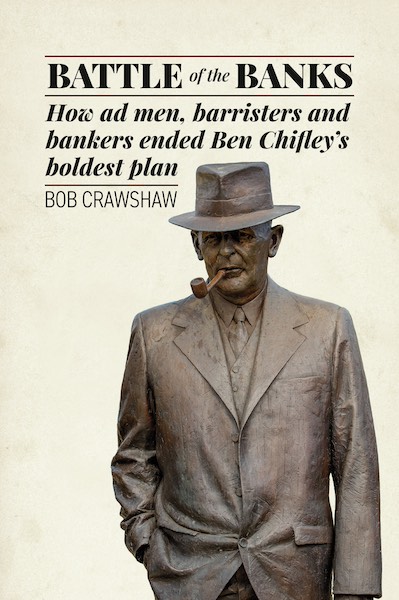 Event Date & Time: Thursday, 16 April 2026 @ 1.00 pm – 2.00 pm
Event Date & Time: Thursday, 16 April 2026 @ 1.00 pm – 2.00 pm
Event Location: History House, 133 Macquarie St, Sydney NSW 2000 (hybrid)
Cost: Free
Event Description:
Bob Crawshaw will explore the dramatic story of Prime Minister Ben Chifley’s 1947 attempt to nationalise Australia’s banking system. It sparked a furious clash between government, the High Court, press barons and business interests, revealing how ideology, law, media and communications and financial power collided in a defining moment for Australian democracy. This episode shaped Australia’s economic future and is among the most contested political struggles in our history.
About the speaker:
Bob Crawshaw is a writer, former soldier, diplomat, and award-winning marketer with a sharp eye for history and politics. He specialises in Australia’s postwar history, blending rigorous research with engaging narrative.
RAHS-WEA Workshop – What lies beneath: A deeper dig into the archives
Event Date & Time: Wednesday, 29 April 2026 @ 11.00 am – 1.00 pm
Event Location: History House, 133 Macquarie St, Sydney NSW 2000 (hybrid)
Cost: RAHS Members $35 | Non-Members $39
Event Description:
This course will offer practical guidance on how to unlock the rich resources of the NSW State Archives Collection, now part of Museums of History NSW, using a selection of case studies. This session will highlight strategies for navigating and interpreting archival records, focusing on stories of individuals, communities, and institutions. Participants will learn how to combine traditional archival research with online tools and resources such as Ancestry and Find my Past, gaining insights into records ranging from immigration and convict history to land, education, and family life. The presentation will empower researchers to confidently trace and contextualise the past.
About the speaker:
Christine Yeats is an archivist and historical researcher with 35 years’ experience, including senior roles at Museums of History NSW (formerly State Records NSW). She managed access to the State’s archives, outreach, and public programs until her retirement in 2012. A past President of both the RAHS and the Federation of Australian Historical Societies, she is also a member of the Australian Dictionary of Biography’s Revision Sub-Committee. In 2023, she was awarded a RAHS Fellowship for her outstanding contributions to Australian history.
